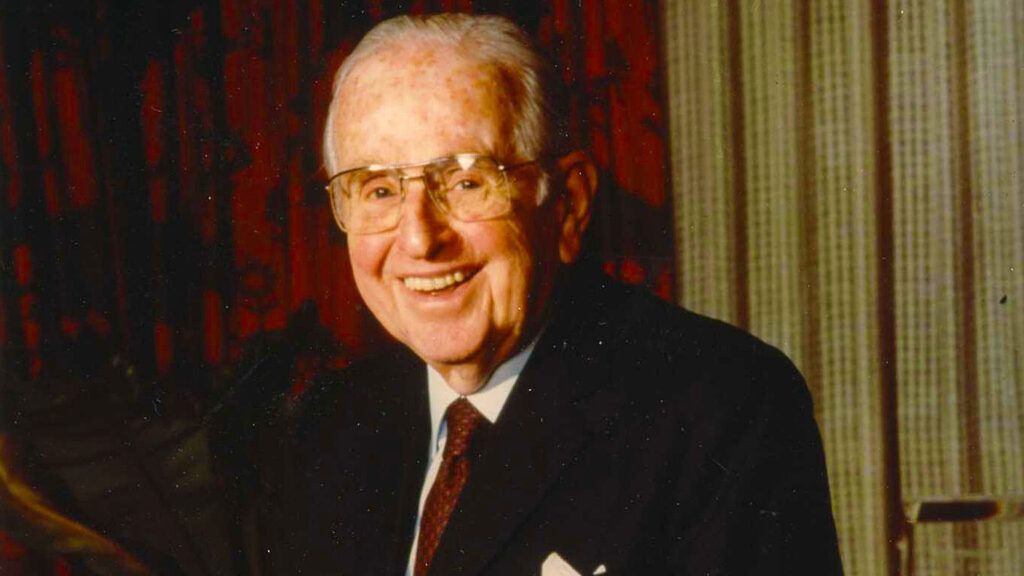When I receive a call for counseling, the people who seek my help usually have some clear-cut reason for their unhappiness: marital difficulties, broken relationships, emotional problems, financial worries. All very specific, very real.
But there are also some whose complaints are harder to pin down. These people are beset by nameless fears and anxieties. They feel isolated and inadequate. The life-force in them has grown dim. They know they are living far below their potential, but they don’t know why. There is something parched and arid about them, like plants deprived of water. And indeed this is their trouble: They are living in a spiritual drought.
These people remind me of a story from sailing-ship days about a vessel becalmed off the coast of South America. Week after week went by; the wind did not blow; the ship could not move. The sailors were dying of thirst when another schooner drifted close enough to read their frantic signals for help. Back came the answer: “Let down your buckets!” When they did, they found water fit to drink beneath their keel. Far from the coast though they were, the freshwater current from the mighty Amazon River surrounded them. All they had to do was reach for it.
I like that story, because I have spent my life trying to persuade people that the love of God surrounds them at all times, and the way to “let down their buckets” into this limitless reservoir is to apply the insights and principles set forth so clearly in the Bible.
There is nothing obscure or complicated about this message. It tells us that God designed us to live joyous, productive, successful lives. To achieve such lives, he knew we would need his help, and he promised that this flow of power would be available to all who would follow the instructions He set down very plainly. You can choose to accept that blueprint for living. You can choose to ignore it. The choice you make has everything to do with the transmission of that power.
Anyone who observes people closely knows that certain attitudes and certain actions are destructive. Fear, hatred, anger, self-doubt, cruelty, dishonesty, selfishness, promiscuity. These negative forces can reduce the flow of power to a trickle, or in some cases shut it off altogether.
So when spiritually enervated people come to me, I try to offer some suggestions designed to unblock the flow of power in their lives. Here are four of those suggestions .
1. Have a heart-to-heart talk with your conscience.
A remarkable thing, the human conscience. Some people claim they have none, but this is not true. God built a sense of right and wrong into us whether we admit it or not. A wise Frenchwoman, Madame de Stall, once wrote, “The voice of conscience is so delicate that it is easy to stifle it, but it is also so clear that it is impossible to mistake it.”
It has been my observation that one of the most common causes of depression, spiritual anemia and alienation from God is a repressed sense of guilt festering in the unconscious mind. Being human, we all make mistakes. And often, being human, we try to sweep them under the rug. But this is just asking for trouble, because the penalty is a feeling of unworthiness, a loss of self-esteem, a decline of confidence. Countless unhappy people go through life dragging these chains when what they need to do is face up to the transgression, acknowledge it, make amends, ask God’s forgiveness, then forgive themselves.
Your conscience will tell you when you need to do that, if you will just listen to it. Give it a chance!
2. Harness the healing forces in gratitude.
“Be thankful for it!” I sometimes say to a dejected visitor. “For what?” he will reply glumly. “For something you’re taking for granted,” I tell him. I might reach out and touch his hand. “What’s that?” I ask. “It’s my hand,” he will say, surprised. “So it is,” I agree, “but look at it. What an amazing instrument it is! How endless the shapes it can assume, how remarkable the uses it has! Suppose you didn’t have the use of your hands. Or your eyes. Or your ears. Suppose you could never see a sunset again. Or hear a symphony orchestra play.
“To an amazing extent,” I tell him, “appreciation for what you have can lift the depression that comes from dwelling on what you have not. Your mind can hold only one idea at a time. So you can cancel out the gloom of a minus by making yourself focus on a satisfying plus.”
3. Reverse your affirmations.
This third suggestion is one I sometimes give to visitors who come shrouded in gloom and despondency. Their evaluation of themselves is always low, right down on the floor. “I’m no good,” they say. “I’m worn out. I just can’t cope.” To these unhappy souls I sometimes offer these three words: “Reverse your affirmations.”
When they ask me what I mean, I reply that the thoughts in our minds dominate and determine the realities in our lives. Wise men and women have always known this. The Bible puts it succinctly: “As he thinketh in his heart, so is he.” My dictionary says that the word “affirm” means “to state positively or with confidence, declare as a fact, assert to be true.” Almost by definition, then, there is great power in a ringing affirmation.
Years ago a French psychotherapist named Emile Coue urged people to say to themselves, “Every day in every way I am getting better and better.” Some critics accused Coue of encouraging egotism. Others said his message was based on an impossibility: raising oneself by one’s psychological bootstraps. But Coue had hold of something just the same: the power of affirmation to change lives.
My disconsolate visitors need a new image of themselves if they are to escape from the prison of self-doubt that is part of their spiritual drought. As a first step, I urge them to focus on the concept that God made them, and being the Master Craftsman, he made them well. Therefore the good, or at least the potential good, in them far outweighs the bad. “Affirm this,” I say to them, “every single day. Accept it. Believe it. Let this conviction saturate every fiber of your being, and ultimately, astonishing things will happen. I guarantee it!”
4. Listen to what God said.
This suggestion is really the simplest and most effective of all. When someone comes to see me, I point out that they have come to me seeking help, and I am glad to do what I can. “But you know,” I say, “2,000 years ago a person walked this earth who was the sum of all wisdom. He spent three years talking to ordinary people with problems just like yours. He said that heaven and earth would pass away, but his words would not—and they haven’t. They’re available everywhere, as close as the nearest church, the nearest bookstore, the nearest library. How to live happy, useful lives? Be good. Be honorable. Be loving. Be kind. If you think you have troubles, why not listen to what he said? His words will fall like cooling rain on the parched and withered areas of your soul.”
The Gospel of St. John puts it plainly. Speaking of Jesus he wrote, “But as many as received Him, to them He gave . . .” Gave what? Gave power. If you are trying to escape from a spiritual drought, why not reach for that power?
It’s right there, waiting.
Download your FREE positive thinking ebook!






